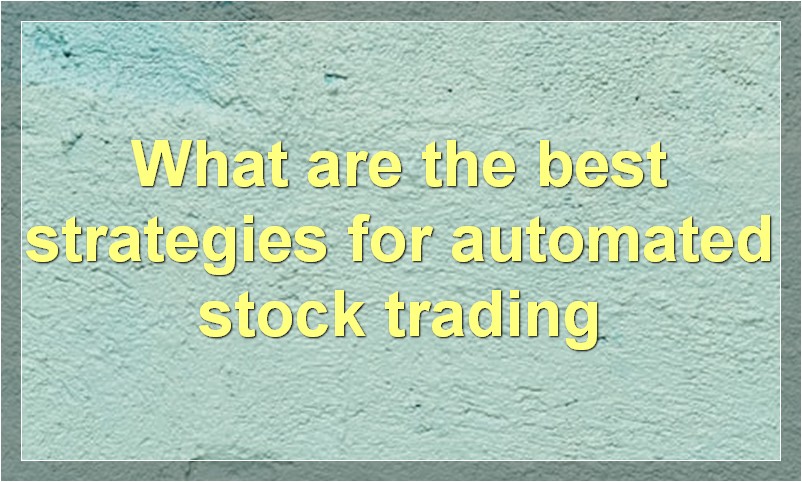Arguing over whether or not to automate stock trading is missing the point – the real question is how to do it safely.
What are the benefits of automating stock trading

There are many benefits of automating stock trading. Perhaps the most obvious benefit is that it can save you a lot of time. If you are manually entering and exitings trades, this process can take up a considerable amount of time, especially if you are trading multiple times throughout the day. Automated stock trading can help to eliminate this issue by automatically placing trades for you based on your predetermined criteria.
Another benefit of automated stock trading is that it can help to take the emotion out of trading. When you are manually entering trades, it can be easy to let your emotions get the best of you and make impulsive decisions that may not be in your best interest. However, when you automate your stock trading, you will be following a set plan that is not based on emotion, but rather on logic and data. This can help you to make more informed and objective decisions about your trades.
Overall, automated stock trading can offer a number of advantages and benefits for investors and traders. If you are looking to save time or take the emotion out of your trading, then automating your stock trading may be the right solution for you.
What are some of the risks associated with automating stock trading
There are a number of risks associated with automating stock trading. One of the main risks is that the system may make errors when placing trades. This could result in losses for the trader. Another risk is that the system may not be able to keep up with market conditions and make poor decisions. This could also lead to losses. Finally, if the system is not well designed, it could place too much emphasis on short-term gains and make bad investment decisions.
What software is available to automate stock trading
There are many software programs available that can automate stock trading. Some of the more popular ones include TradeStation, MetaTrader, and NinjaTrader. These programs allow traders to set up their own trading strategies and then execute them automatically.
How do I set up automated stock trading
There are a few different ways that you can set up automated stock trading. You can use a software program that will automatically trade for you based on certain parameters that you set, or you can set up an account with a broker that offers automated trading.
If you want to use a software program to trade automatically, there are a few different things that you need to consider. First, you need to find a reputable program that has a good track record. There are many programs out there that claim to be the best, but not all of them live up to their promises. Do your research and read reviews before choosing a program.
Next, you need to decide what criteria you want the program to use to make trades. For example, you might want it to only buy stocks when they are at a certain price, or you might want it to sell when they reach a certain price. You can also set up more complex rules, such as only buying stocks of companies that have a certain rating from analysts.
Once you have chosen a program and set up your criteria, you need to fund your account and let the program do its job. Some programs will require you to keep a minimum amount of money in your account, while others will allow you to trade with just the money in your account at the time of the trade.
Automated stock trading can be a great way to make money in the stock market without having to do any work yourself. However, it is important to remember that there is always some risk involved, so don’t put all of your eggs in one basket.
What are the best strategies for automated stock trading

Automated stock trading is a process where computer software is used to trade stocks on behalf of the investor. This type of trading is also known as algorithmic trading or black-box trading.
There are many different strategies that can be used for automated stock trading. Some common strategies include:
1. mean reversion: this strategy looks for stocks that have been oversold or undervalued and then buys them in anticipation of a price rebound.
2. momentum: this strategy buys stocks that are showing strong upward momentum and sells them after they have peaked.
3. arbitrage: this strategy exploits differences in prices between different markets or exchanges.
4. value: this strategy looks for stocks that are undervalued by the market and buys them in anticipation of future price appreciation.
5. growth: this strategy focuses on buying stocks of companies that are expected to experience high levels of growth in the future.
Which of these strategies is best for you will depend on your investment goals and risk tolerance. If you are willing to take on more risk, then a momentum or growth strategy may be right for you. However, if you are looking for more stability, then a mean reversion or value strategy may be a better fit.
No matter what strategy you choose, automated stock trading can help you to save time and make more informed decisions about when to buy and sell stocks.
How do I choose stocks to trade automatically
When it comes to choosing stocks to trade automatically, there are a few key things you need to keep in mind. First, you need to make sure that the company is financially strong and has a good track record. Secondly, you need to look at the company’s history and see how it has performed in the past. Lastly, you need to do your own research and find out as much as you can about the company before making your decision.
What news sources do automated stock traders use
The majority of automated stock traders use a combination of news sources in order to make decisions. This includes both traditional sources, such as Bloomberg and Reuters, as well as more modern sources, such as Twitter and StockTwits.
The use of news sources is essential for automated stock traders, as they need to be able to keep up with the latest information in order to make informed decisions. However, it is also important to note that automated stock traders need to be able to filter out the noise in order to focus on the most relevant information.
What economic indicators do automated stock traders track
There are a number of different economic indicators that automated stock traders track. The most important ones include GDP, inflation, employment data, and interest rates. By monitoring these indicators, automated stock traders can get a better sense of where the economy is heading and how it might impact the stock market.
Does automated stock trading work in all market conditions
Automated stock trading systems are designed to take the emotion out of trading by automatically executing trades based on pre-determined criteria. But do they work in all market conditions?
There is no easy answer when it comes to automated stock trading. These systems can be effective in certain market conditions, but may not perform as well in others. It really depends on the individual system and how it is configured.
Some automated systems may do well in a trending market, but may struggle in a choppy or range-bound market. Others may excel in volatile conditions, but may get whipsawed in a more subdued market.
The best way to find out if an automated stock trading system will work in all market conditions is to test it out in a demo account first. This will give you a chance to see how it performs in different types of market conditions without risking any real money.

